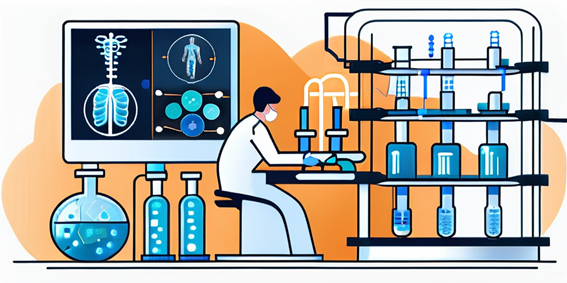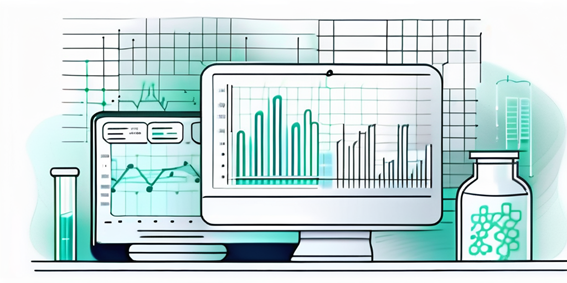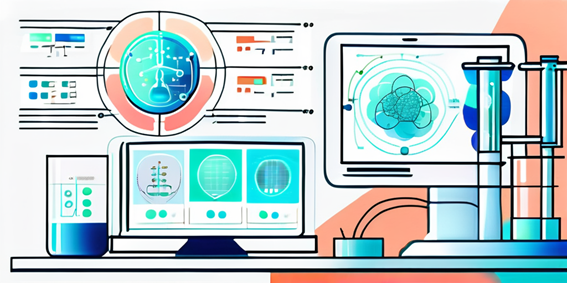Personalized medicine is revolutionizing the healthcare industry, and the integration of artificial intelligence (AI) is fueling this transformation. AI technologies have significantly advanced our ability to analyze vast amounts of complex data, leading to improved diagnosis and treatment outcomes. In this article, we will explore the pivotal role that AI plays in revolutionizing personalized medicine, its impact on disease detection, diagnosis, and the future of healthcare.
Traditional approaches to medicine often took a generalized approach to treatment, assuming that one size fits all. However, it has become increasingly clear that individual variations in genetics, lifestyle, and environment significantly impact an individual’s response to treatment. This realization sparked the emergence of personalized medicine—an approach that tailors medical interventions to the unique characteristics of each patient.

Personalized medicine has revolutionized the healthcare industry by recognizing the importance of individual differences in treatment outcomes. By considering a patient’s genetic makeup, lifestyle choices, and environmental factors, healthcare professionals can now develop targeted interventions that are more likely to yield positive results. This shift towards personalized medicine has not only improved patient outcomes but has also led to a more patient-centered approach to healthcare.
However, the true potential of personalized medicine has been unlocked with the integration of artificial intelligence (AI). AI algorithms can process extensive patient data, including genetic information, medical records, and lifestyle factors, to create personalized treatment plans. By analyzing patterns and correlations within this data, AI can identify hidden insights and predict individual treatment responses with unprecedented accuracy.
AI integration in personalized medicine has opened up new avenues for research and treatment development. With the ability to analyze vast amounts of data in a short period, AI algorithms can identify subtle patterns and associations that may have otherwise gone unnoticed. This has led to the discovery of new biomarkers, genetic variants, and therapeutic targets, paving the way for more effective and precise interventions.
Furthermore, AI-powered personalized medicine has the potential to enhance preventive care. By analyzing an individual’s genetic predispositions, lifestyle choices, and environmental factors, AI algorithms can identify individuals who are at a higher risk of developing certain diseases. This early identification allows healthcare professionals to implement preventive measures and interventions, reducing the burden of disease and improving overall population health.
Another significant advantage of AI integration in personalized medicine is the ability to continuously learn and adapt. AI algorithms can analyze treatment outcomes and patient responses in real-time, allowing for the refinement and optimization of treatment plans. This iterative process ensures that interventions are constantly improving and evolving, leading to better patient outcomes over time.
However, it is important to acknowledge the challenges and ethical considerations associated with AI integration in personalized medicine. Privacy concerns, data security, and algorithm bias are some of the issues that need to be addressed to ensure the responsible and ethical use of AI in healthcare. Transparency, accountability, and robust regulatory frameworks are essential to mitigate these risks and ensure that AI integration in personalized medicine benefits all individuals.
In conclusion, the evolution of personalized medicine from traditional approaches to AI integration has revolutionized the healthcare industry. By considering individual variations in genetics, lifestyle, and environment, personalized medicine has improved patient outcomes and shifted towards a more patient-centered approach. The integration of AI has further enhanced the precision and efficacy of personalized medicine, allowing for the development of targeted interventions and the discovery of new insights. However, it is crucial to address the ethical considerations associated with AI integration to ensure responsible and equitable healthcare practices.
Before delving deeper into AI’s role in personalized medicine, it is crucial to understand the basics of artificial intelligence. At its core, AI refers to the development of computer systems capable of performing tasks that typically require human intelligence, such as problem-solving, decision-making, and pattern recognition.
Machine learning, a subset of AI, enables computer programs to learn from data and improve their performance over time without explicit programming. This revolutionary technology has transformed various industries, including healthcare. In the context of personalized medicine, machine learning algorithms can analyze vast amounts of patient data, including genetic information, medical history, and lifestyle factors, to identify patterns and make predictions about an individual’s health outcomes.
However, machine learning is just one piece of the puzzle. Deep learning, a more advanced form of machine learning, utilizes neural networks to analyze complex relationships within data, making it particularly suited for personalized medicine. These neural networks are inspired by the structure and function of the human brain, allowing them to process and interpret data in a way that resembles human cognition.
Deep learning algorithms excel at tasks such as image recognition, natural language processing, and speech recognition. In personalized medicine, these algorithms can be trained to analyze medical images, such as MRI scans or pathology slides, and identify subtle patterns or anomalies that may indicate a specific disease or condition. By leveraging the power of deep learning, healthcare professionals can make more accurate diagnoses and develop personalized treatment plans tailored to each patient’s unique needs.
Furthermore, AI-powered systems can assist healthcare providers in predicting patient outcomes and determining the most effective interventions. By analyzing large datasets containing information about patients with similar characteristics and medical histories, AI algorithms can generate insights that help clinicians make informed decisions about treatment options. This not only improves patient outcomes but also optimizes healthcare resource allocation, ensuring that resources are allocated to those who need them the most.
It is important to note that while AI holds great promise for personalized medicine, it is not without its challenges. Ethical considerations, such as data privacy and algorithmic bias, must be carefully addressed to ensure the responsible and equitable use of AI in healthcare. Additionally, the integration of AI into clinical practice requires collaboration between healthcare professionals, data scientists, and regulatory bodies to establish guidelines and standards for implementation.
In conclusion, artificial intelligence, particularly machine learning and deep learning, has the potential to revolutionize personalized medicine. By leveraging the power of AI, healthcare professionals can analyze vast amounts of data, identify patterns, and make predictions that enable more accurate diagnoses and personalized treatment plans. However, the responsible and ethical use of AI in healthcare requires careful consideration of privacy, bias, and regulatory frameworks. With continued advancements in AI technology and collaboration across disciplines, the future of personalized medicine looks promising.
Big data plays a pivotal role in personalized medicine, enabling healthcare professionals to analyze vast quantities of information to make data-driven decisions. AI algorithms excel at processing big data, bringing speed and efficiency to complex analysis tasks.

By leveraging AI technologies, healthcare providers can combine diverse sources of data, including medical records, genomic profiles, wearable device data, and patient-reported outcomes. This integration empowers clinicians to generate more accurate diagnoses, identify optimal treatment options, and predict disease progression.
One of the key benefits of harnessing big data in personalized medicine is the ability to analyze large-scale genomic data. Genomic profiles provide valuable insights into an individual’s genetic makeup, allowing healthcare professionals to identify genetic variations that may contribute to disease susceptibility or treatment response. With AI algorithms, these genomic profiles can be analyzed at an unprecedented scale and speed, enabling the identification of rare genetic variants and their potential impact on personalized medicine.
Moreover, wearable device data has become increasingly popular in personalized medicine. These devices, such as fitness trackers and smartwatches, collect real-time data on various health parameters, including heart rate, sleep patterns, and physical activity. By integrating this data with other medical records and genomic profiles, AI algorithms can uncover patterns and correlations that may not be apparent to the human eye. This holistic approach to data analysis enables healthcare professionals to gain a comprehensive understanding of an individual’s health status and tailor treatment plans accordingly.
Another area where big data and AI intersect in personalized medicine is the analysis of patient-reported outcomes. Patient-reported outcomes capture information directly from patients about their symptoms, quality of life, and treatment preferences. Traditionally, these outcomes were collected through surveys and questionnaires, making it challenging to process and analyze the data on a large scale. However, with AI algorithms, healthcare providers can automate the analysis of patient-reported outcomes, extracting valuable insights and trends that can inform personalized treatment decisions.
Furthermore, the integration of big data and AI in personalized medicine has the potential to revolutionize disease prediction and prevention. By analyzing large datasets, AI algorithms can identify subtle patterns and risk factors that may contribute to the development of certain diseases. This predictive capability allows healthcare professionals to intervene early, implementing preventive measures and personalized interventions to mitigate the risk of disease onset or progression.
In conclusion, the combination of big data and AI in personalized medicine holds immense promise for improving healthcare outcomes. By harnessing the power of AI algorithms, healthcare professionals can leverage diverse sources of data to generate more accurate diagnoses, identify optimal treatment options, and predict disease progression. The expanded use of genomic profiles, wearable device data, and patient-reported outcomes, along with the ability to analyze large-scale datasets, opens up new avenues for personalized medicine and empowers healthcare professionals to deliver targeted and effective care.
Accurate and timely diagnosis is the cornerstone of effective treatment. AI is revolutionizing disease detection and diagnosis by augmenting the capabilities of healthcare professionals and reducing diagnostic errors.
Through AI algorithms, doctors can analyze patient data, detect subtle patterns, and identify early signs of diseases. For instance, AI can analyze medical images, such as X-rays and MRIs, to identify abnormalities that may go unnoticed to the human eye. Furthermore, AI-powered diagnostic tools can provide real-time analysis and recommendations during surgeries, optimizing surgical outcomes.
AI’s ability to process and analyze large datasets allows for the development of predictive models, enabling healthcare providers to identify high-risk individuals and implement preventive measures to mitigate disease progression.
The integration of AI in personalized medicine has already shown immense promise, but its potential is far from fully realized. AI will continue to play a pivotal role in transforming healthcare across various domains.

As more data becomes available, AI algorithms will become increasingly accurate, leading to personalized treatment plans that optimize patient outcomes. With AI technologies at its core, precision medicine will continue to expand its reach, enabling tailored therapies for a wide range of conditions.
Moreover, the integration of AI with wearable devices and remote patient monitoring will facilitate real-time data collection, enabling healthcare providers to continuously monitor patients outside traditional clinical settings.
In conclusion, AI’s role in personalized medicine is reshaping the healthcare landscape. By harnessing the power of AI, healthcare professionals can provide more targeted treatments, reduce diagnostic errors, and improve patient outcomes. As AI continues to evolve, its influence will only grow stronger, ushering in a new era of personalized healthcare.